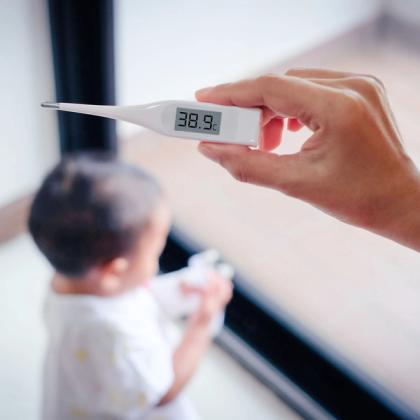This podcast episode is worth 0.27 CPD credits. Upgrade to Pro
Febrile seizures are common in the first 5 years of life, and many factors that increase the risk of such seizures occurring have been identified. Initial evaluation should determine whether features of a complex seizure are present, as well as identifying the source of fever. In this episode, Dr Roger Henderson provides an overview of febrile seizures in childhood and also looks at risk factors, referral criteria, treatment options and prognosis.
Key take-home points
- A febrile seizure can be defined as a seizure occurring in a febrile child (temperature ≥100.4°F or 38°C) who does not have an intracranial infection, metabolic disturbance or history of afebrile seizures.
- Febrile seizures commonly occur in children between the ages of 6 and 60 months. The highest incidence is in children who are aged between 12 and 18 months.
- Febrile seizures may be classified as simple or complex depending on clinical features, duration and recurrence.
- Febrile seizures are common in childhood. The cumulative incidence is estimated to be between 2% and 5% in the US and Western Europe.
- Viral infections triggering fever are the most common cause, with bacteraemia being an infrequent cause. However, some children who present with a febrile seizure have no identifiable risk factor.
- Infants who present with a suspected febrile seizure under the age of 6 months require careful medical evaluation.
- The seizure is commonly short in duration (most last less than 10 minutes), with the recovery of consciousness being fast and without any sequelae. The temperature is generally very high.
- A seizure that is focal, lasts more than 15 minutes, or is repeated within a 24-hour period is classified as a complex febrile seizure.
- Call an emergency ambulance if the seizure lasts for more than 5 minutes, or if you suspect meningitis/meningococcal disease, encephalitis or any other serious or life-threatening cause of fever, such as sepsis.
- If you have a child with recurrent febrile seizures, and whose specialist has advised this, give an emergency benzodiazepine such as buccal midazolam or rectal diazepam. These may be repeated once after 10 minutes if the seizure has not stopped.
- Arrange an immediate hospital assessment by a paediatrician if it is the first febrile seizure the child has had (or it is a subsequent febrile seizure and the child has not had a specialist assessment).
- Consider urgent hospital assessment for a period of observation if the child has unexplained fever and no apparent focus of infection.
- There is no evidence that antipyretics reduce the number of febrile seizures.
- These types of seizure do not typically recur beyond the age of 5 or 6, and there is no evidence for any increased risk of death linked to them, even for children with status seizures.
- Around one in three children will have a recurrence at some time following an initial febrile seizure. Risk factors contributing to this include a family history of febrile seizures, an onset at a very early age and a shorter duration of the fever at onset.
Key references
- Sawires R, et al. Front Pediatr. 2022;9:801321. doi: 10.3389/fped.2021.801321.
- NICE. 2019. https://www.nice.org.uk/guidance/ng143.
- Graves RC, et al. Am Fam Physician. 2012;85(2):149-53.
- Mefford HC. Science Translational Medicine. 2014;6(263):263ec200. doi: 10.1126/scitranslmed.aaa2063.
- Offringa M, et al. Cochrane Database Syst Rev. 2021;6(6):CD003031. doi: 10.1002/14651858.CD003031.pub4.
- Patel AD and Vidaurre J. J Child Neurol. 2013;28(6):762-7. doi: 10.1177/0883073813483569.
Create an account to add page annotations
Annotations allow you to add information to this page that would be handy to have on hand during a consultation. E.g. a website or number. This information will always show when you visit this page.
